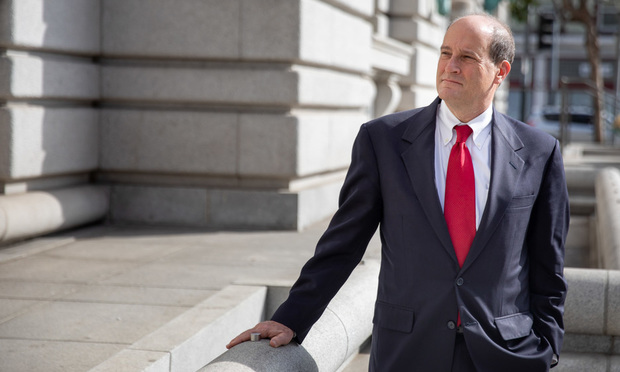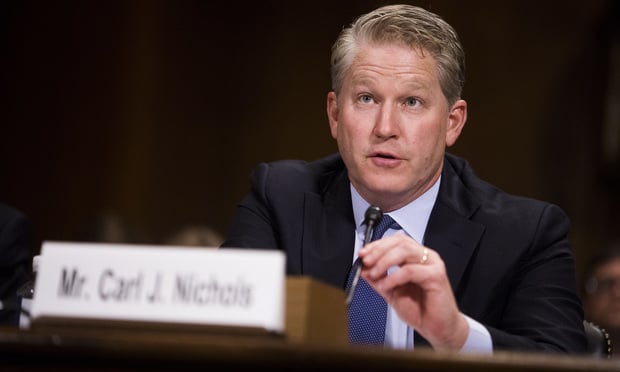Judge Will Let Trump Have His Day in Court to Fight Release of NY Tax Records
"The court will also order that the congressional defendants not receive the requested records for a period of fourteen days, during which time the court can decide whether the request is lawful," U.S. District Judge Carl Nichols said in an order late Monday.
November 18, 2019 at 06:37 PM
6 minute read
 Douglas Letter, general counsel to the U.S. House of Representatives. Photo: Jason Doiy/ALM
Douglas Letter, general counsel to the U.S. House of Representatives. Photo: Jason Doiy/ALM
Updated at 11:26 p.m.
A federal judge in Washington late Monday directed House Democrats to notify Donald Trump of any request for his New York state tax returns and to wait two weeks before receiving those documents, a move designed to give the president time to contest congressional access to financial records he has kept closely guarded.
U.S. District Judge Carl Nichols, the Trump's administration's latest appointee to the Washington federal trial court, issued the order hours after House lawyers committed to alerting the president's lawyers of any ask for his state tax returns. In establishing a two-week waiting period for receiving those records, however, Nichols went beyond the House Democrats' concession, fashioning a solution to a procedural issue that has concerned him since Trump sued in July to block access to his state tax returns.
For months, House Democrats have argued Trump's lawsuit should be dismissed, in part because lawmakers have not yet asked New York to provide copies of his tax returns. New York's Trust Act, adopted this year, allows the state to turn over the president's financial records.
Trump's personal lawyer, William Consovoy, has countered that the newly enacted state law put the president in an "impossible bind" that raised the possibility of House lawmakers requesting and receiving the state tax returns before Trump had a chance to respond in court.
At a hearing Monday afternoon, Nichols grappled with that conundrum, appearing to sympathize with the president's concerns that any request for his state tax returns could set in motion a fast-moving process that would at once ripen his legal claims and render them moot.
 Carl Nichols testifies before the Senate Judiciary Committee during his confirmation hearing to be U.S. District Judge for the District of Columbia, on Wednesday, August 22, 2018. Credit: Diego M. Radzinschi /NLJ
Carl Nichols testifies before the Senate Judiciary Committee during his confirmation hearing to be U.S. District Judge for the District of Columbia, on Wednesday, August 22, 2018. Credit: Diego M. Radzinschi /NLJ"The court recognizes the congressional defendants' recent commitment and will require them to provide the court and Mr. Trump with contemporaneous notice of any request made by Chairman Neal," Nichols wrote in a decision hours later, referencing the leader of the House Ways and Means Committee.
"But because contemporaneous notice alone would not protect Mr. Trump's claims from potentially becoming moot, the court will also order that the congressional Defendants not receive the requested records for a period of fourteen days, during which time the Court can decide whether the request is lawful. In the court's view, this relief ensures that Mr. Trump has an opportunity to press his claims before they become moot while treading as lightly as possible on the congressional Defendants' interests."
At Monday's hearing, Nichols asked House lawyers whether they would commit to alert him and Trump of any forthcoming request for the New York state tax returns. House lawyer Josephine Morse said lawmakers would notify Nichols of any request while Trump's case remained pending before him.
"We can notify the court at that time, but that is all we are in a position to do," Morse said.
Nichols asked whether the House would commit to notifying him and Trump even if he dismissed the president's lawsuit. Morse said she needed to confer with her colleagues, and hours later, House general counsel Douglas Letter made that commitment in a court filing.
"If this court grants the committee defendants' motion to dismiss, undersigned counsel agrees that should [House Ways and Means Committee] Chairman Neal make a request under the TRUST Act relating to Plaintiff Donald J. Trump during the 116th Congress, counsel will notify the Court and counsel for the Plaintiff that such a request has been made," Letter wrote.
Monday's hearing came at a crucial juncture in Trump's bid to block access to his state tax returns. On Nov. 11, Nichols dismissed the president's claims against New York, siding with the state government's argument that the Washington federal court lacked jurisdiction. Nichols had earlier barred New York from delivering Trump's tax returns to the House until a week after his decision on the jurisdictional question. That week-long respite for Trump expired Monday.
"I'm obviously well-aware of the timing concerns here," Nichols said in court, noting that the "seven-day clock" had been running since he dismissed the claims against New York last week.
Consovoy on Monday said he stands by the claims against New York, including an argument that the Trust Act violates Trump's First Amendment rights. But he said Trump presently has no plans to sue the state in a New York federal court, where a lawsuit against the state government might stand on firmer jurisdictional ground.
The case before Nichols is one of several involving congressional or law enforcement access to Trump's financial records.
Last week, lawyers for Trump asked the U.S. Supreme Court to review a lower court ruling that allowed the Manhattan district attorney's office to obtain eight years' worth of the president's personal and corporate tax returns from his accounting firm, Mazars USA. Trump's lawyers have also asked the Supreme Court to block a congressional subpoena issued to Mazars.
In a separate case in Washington, House Democrats are challenging the Treasury Department's refusal to turn over Trump's federal tax returns. The case is pending before another Trump appointee, U.S. District Judge Trevor McFadden, who said in court recently that House Democrats have strong arguments that the Treasury Department is required under the law to provide Congress with those financial records.
Read more:
Trump Tax Return Cases Could Put Time Squeeze on Supreme Court
How WilmerHale's Carl Nichols Got Trump's Nod for DC Federal Trial Bench
Who Is Trevor McFadden? Meet the Judge Assigned the Trump Tax Returns Case
House Tells DC Circuit Trump May Have Lied to Mueller
Judge Strikes Trump's Claims Against New York Officials in Tax Returns Lawsuit
This content has been archived. It is available through our partners, LexisNexis® and Bloomberg Law.
To view this content, please continue to their sites.
Not a Lexis Subscriber?
Subscribe Now
Not a Bloomberg Law Subscriber?
Subscribe Now
NOT FOR REPRINT
© 2025 ALM Global, LLC, All Rights Reserved. Request academic re-use from www.copyright.com. All other uses, submit a request to [email protected]. For more information visit Asset & Logo Licensing.
You Might Like
View All
CFPB Resolves Flurry of Enforcement Actions in Biden's Final Week

Wells Fargo and Bank of America Agree to Pay Combined $60 Million to Settle SEC Probe

Supreme Court May Limit Federal Prosecutions Over 'Misleading' but True Statements

CFPB Alleges Berkshire Hathaway Subsidiary Originated Unaffordable Housing Loans
Law Firms Mentioned
Trending Stories
- 1Pro Hac Vice in Georgia: Rule Change for Nonresident Attorneys
- 2The Benefits of E-Filing for Affordable, Effortless and Equal Access to Justice
- 3AI and Social Media Fakes: Are You Protecting Your Brand?
- 4A Primer on Using Third-Party Depositions To Prove Your Case at Trial
- 5‘Catholic Charities v. Wisconsin Labor and Industry Review Commission’: Another Consequence of 'Hobby Lobby'?
Who Got The Work
J. Brugh Lower of Gibbons has entered an appearance for industrial equipment supplier Devco Corporation in a pending trademark infringement lawsuit. The suit, accusing the defendant of selling knock-off Graco products, was filed Dec. 18 in New Jersey District Court by Rivkin Radler on behalf of Graco Inc. and Graco Minnesota. The case, assigned to U.S. District Judge Zahid N. Quraishi, is 3:24-cv-11294, Graco Inc. et al v. Devco Corporation.
Who Got The Work
Rebecca Maller-Stein and Kent A. Yalowitz of Arnold & Porter Kaye Scholer have entered their appearances for Hanaco Venture Capital and its executives, Lior Prosor and David Frankel, in a pending securities lawsuit. The action, filed on Dec. 24 in New York Southern District Court by Zell, Aron & Co. on behalf of Goldeneye Advisors, accuses the defendants of negligently and fraudulently managing the plaintiff's $1 million investment. The case, assigned to U.S. District Judge Vernon S. Broderick, is 1:24-cv-09918, Goldeneye Advisors, LLC v. Hanaco Venture Capital, Ltd. et al.
Who Got The Work
Attorneys from A&O Shearman has stepped in as defense counsel for Toronto-Dominion Bank and other defendants in a pending securities class action. The suit, filed Dec. 11 in New York Southern District Court by Bleichmar Fonti & Auld, accuses the defendants of concealing the bank's 'pervasive' deficiencies in regards to its compliance with the Bank Secrecy Act and the quality of its anti-money laundering controls. The case, assigned to U.S. District Judge Arun Subramanian, is 1:24-cv-09445, Gonzalez v. The Toronto-Dominion Bank et al.
Who Got The Work
Crown Castle International, a Pennsylvania company providing shared communications infrastructure, has turned to Luke D. Wolf of Gordon Rees Scully Mansukhani to fend off a pending breach-of-contract lawsuit. The court action, filed Nov. 25 in Michigan Eastern District Court by Hooper Hathaway PC on behalf of The Town Residences LLC, accuses Crown Castle of failing to transfer approximately $30,000 in utility payments from T-Mobile in breach of a roof-top lease and assignment agreement. The case, assigned to U.S. District Judge Susan K. Declercq, is 2:24-cv-13131, The Town Residences LLC v. T-Mobile US, Inc. et al.
Who Got The Work
Wilfred P. Coronato and Daniel M. Schwartz of McCarter & English have stepped in as defense counsel to Electrolux Home Products Inc. in a pending product liability lawsuit. The court action, filed Nov. 26 in New York Eastern District Court by Poulos Lopiccolo PC and Nagel Rice LLP on behalf of David Stern, alleges that the defendant's refrigerators’ drawers and shelving repeatedly break and fall apart within months after purchase. The case, assigned to U.S. District Judge Joan M. Azrack, is 2:24-cv-08204, Stern v. Electrolux Home Products, Inc.
Featured Firms
Law Offices of Gary Martin Hays & Associates, P.C.
(470) 294-1674
Law Offices of Mark E. Salomone
(857) 444-6468
Smith & Hassler
(713) 739-1250










